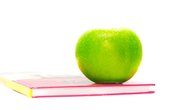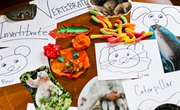Daily science activities get the students warmed up and ready for the day's lesson. Warm-up activities are often quick and simple requiring only minimal supplies. This allows the class to start the science warm-up immediately and finish it swiftly without cutting into a significant amount of the instructional time. Adapt the science starter activities to fit the specific science topics you're studying.
Science Journal
A science journal combines science with writing skills. A ringed notebook is a simple option for the science journals. Each child writes in her journal for a specified amount of time. Five to 10 minutes is sufficient depending on the age of the students and the amount of time available for the activity. Assign a specific science topic for the journal, or ask the kids to write one way they used science since the last time they wrote in their journals. This teaches them that everyday activities such as cooking or checking out the weather relate to science.
Picture Analysis
Display a picture that isn't easily identifiable. A good example is a picture of hair or other objects under a microscope. Any close-up photo or a long-range photo that requires the kids to use their analysis skills is ideal. The students inspect the photo paying close attention to the details to guess what is in the photo. After the students have a few minutes to make a guess, discuss the guesses as a class before revealing the correct answer.
Science Trivia
Write a few science trivia questions on the board before the students arrive in class. The students use the first few minutes of science class to answer the trivia questions. The questions might revolve around the previous day's lesson, a review of concepts from a previous chapter or new concepts you will learn that day in class. Discuss the questions after a few minutes. The discussion helps lead into the day's lesson.
20 Questions
Adapt this popular game to fit the science theme as a classroom warm-up. Choose a scientific concept or tool before the kids arrive. Once everyone is seated, let the kids begin asking yes or no questions about the concept. The students use the clues from the questions to determine the concept. You can also give the kids a chance to come up with words and answer the questions. Keep a pile of cards with words on them in case the kids need ideas when it is their turn to answer questions.
Memory Tray
The memory tray game helps students identify science tools and improves memory. Place several science tools on a tray. Give the kids one minute to examine the tray and its contents. Cover the tray with a towel. The students write down as many of the science tools as they can remember. This warm-up activity works well if you're planning an experiment that day. Place the items you'll use in the experiment on the tray. This gives the students a clue to the experiment they'll do that day.
Related Articles
References
Writer Bio
Based in the Midwest, Shelley Frost has been writing parenting and education articles since 2007. Her experience comes from teaching, tutoring and managing educational after school programs. Frost worked in insurance and software testing before becoming a writer. She holds a Bachelor of Arts in elementary education with a reading endorsement.










